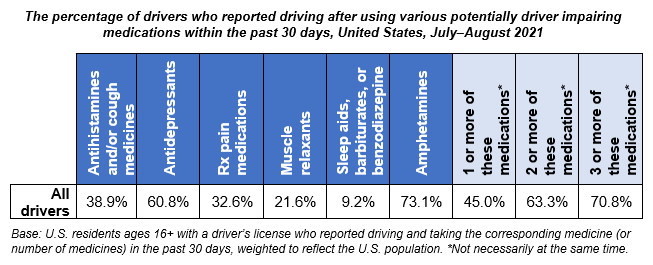BOISE – Most drivers would never get behind the wheel while impaired by alcohol and other drugs, but they may not realize that using prescription and over-the-counter medications can be just as dangerous.
According to new research by the AAA Foundation for Traffic Safety, nearly half of all licensed drivers used one or more potentially driver impairing (PDI) medications in the past 30 days. Of that group, nearly half said that they drove within two hours of using these medications, increasing the risk for themselves and other road users.

AAA’s research also revealed another surprising result – as people used more PDI medications, they reported a higher likelihood of driving just a short time later.
“Common medications like allergy and cough medicine, anti-depressants, prescription pain relievers, and sleep aids can all produce side effects that may limit your ability to safely operate a vehicle, such as dizziness, fatigue, blurred vision, and reduced awareness and reaction time,” says AAA Idaho public affairs director Matthew Conde. “It’s important to understand how these medications may affect your driving and take appropriate steps to protect yourself and others.”
While AAA recommends that drivers continue to take prescribed medications, they should also work with their healthcare provider to find ways to avoid impaired driving.
“When patients received a warning about how a medication could impact their driving, 18% were less likely to get behind the wheel after using them,” Conde said. “But many of the survey respondents didn’t remember receiving such a warning, so there’s still work to be done.”
According to AAA’s research, more than 75% of medication users reported that they received warnings about sleep aids and muscle relaxants, but just 50% said that they received a similar warning about cough medicines and antihistamines. That means that for a given medication, anywhere from 20% to 50% of drivers are unaware of the potential risks of operating a vehicle shortly after use.
AAA offers these tips to help drivers stay safe behind the wheel:
- Explore your options. Ask your healthcare provider about alternatives to potentially impairing medications or consider ways to adjust the size and timing of doses to avoid a potential effect on your driving.
- Have the conversation. If you visit multiple health care providers or pharmacists, they may not have a complete understanding of everything that you’re taking. This increases the chances of a dangerous combination of medications that either amplifies a particular side-effect or that could cancel out potential benefits. Always keep a full list of the medications that you take in your smartphone and ask specifically how they may affect your driving.
- Don’t underestimate the risks of driving after using medications. AAA research finds that nearly 95% of Americans consider driving after drinking alcohol to be very or extremely dangerous, but just 87% felt the same way about potentially impairing medications.
“Of course, we should look out for our own health and wellness, but we also need to protect the safety of everyone on the road,” Conde said. “The good news is that with a little bit of extra effort, it’s possible to do both.”

